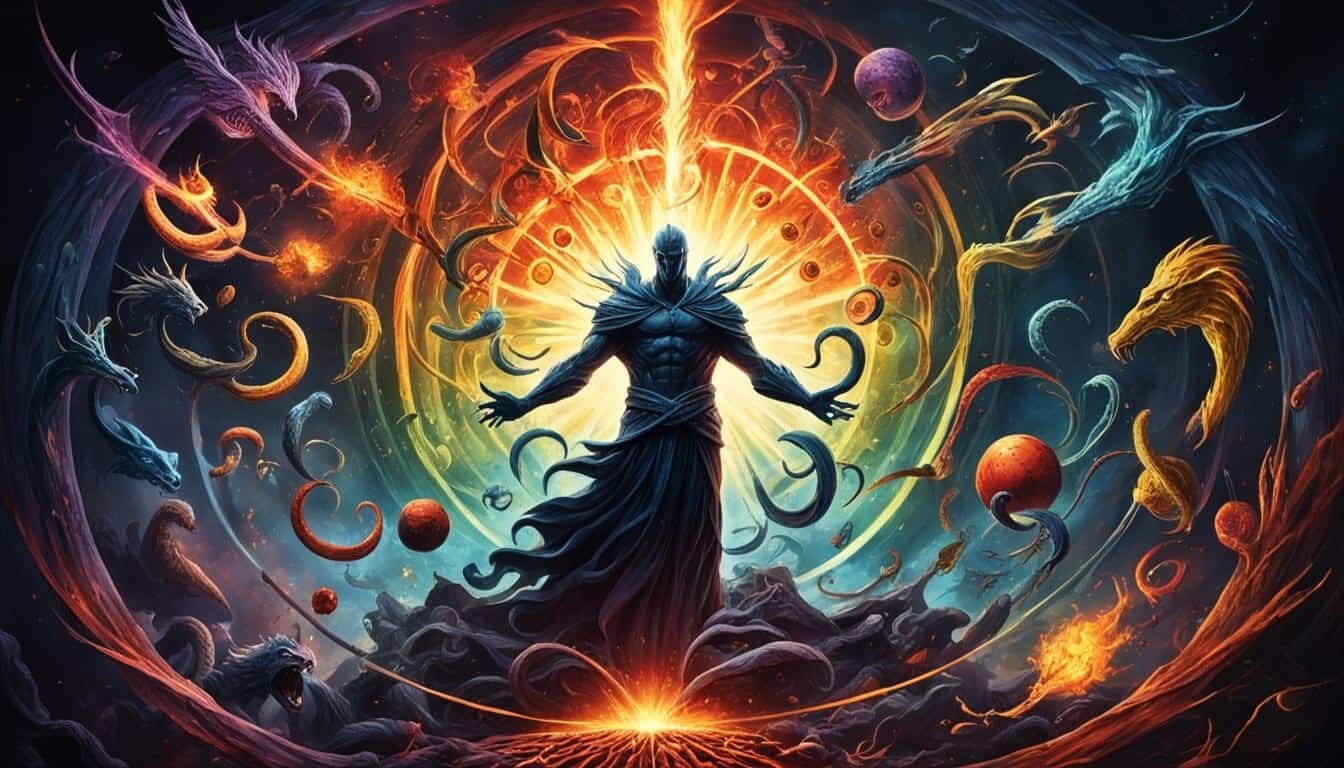Ever wonder what errors our ancestors committed from the start? The book of Genesis reveals stories that show our earliest wrongdoings. These stories talk about faults like pride, disobedience, and violence. They show us the bad outcomes of these actions.
Let’s take a trip through Genesis to learn about these 13 sins. We’ll see what we can learn from these old stories. You might be surprised how they still mean something today. Get ready to think about some things in a new way.
Key Takeaways:
- The book of Genesis exposes 13 sins and iniquities that have plagued humanity since its earliest days.
- Through stories and lessons, we gain insights into the consequences of pride, disobedience, violence, deceit, and more.
- These ancient narratives continue to hold relevance, challenging our common beliefs and prompting reflection on our own actions.
- Join us on this journey through Genesis to unravel the depths of human transgressions and their enduring impact.
- Prepare to confront uncomfortable truths and discover timeless lessons that can shape our understanding of morality.
Pride: Satan’s Rebellion and the Fall from Grace.
In the book of Genesis, we get a deep look into human nature. It tells the story of our early mistakes. These mistakes have shaped our world since the beginning. One of these sins is pride, shown as Satan rebels against God.
Genesis 3:4-5 shows us the talk between the serpent and Eve. This chat is all about pride. The serpent tricks Eve with clever words, starting her down a prideful path. This leads her to disobey God by eating the forbidden fruit.
The whole story is a warning for us all. We learn how pride can lead us astray. It makes us ignore our wrongdoings. Then, we move further from our Creator.
The tale makes us think about pride’s dangers. It’s a sin that sneaks into our lives. This leads to division and pulls us away from God’s great design.
Disobedience: Adam and Eve’s Defiance of God’s Command.
In the book of Genesis, we read about Adam and Eve’s story. They lived in a perfect place called the Garden of Eden. God allowed them everything except eating from the tree of knowledge of good and evil.
But then, a serpent tempted Eve. It made her doubt God’s warning about the tree and the forbidden fruit.
Genesis 3:6: So when the woman saw that the tree was good for food, and that it was a delight to the eyes, and that the tree was to be desired to make one wise, she took of its fruit and ate, and she also gave some to her husband who was with her, and he ate.
Adam and Eve chose to eat the forbidden fruit. They wanted the wisdom it promised. This choice went against God’s wishes.
Adam and Eve’s disobedience had big results. They saw their nakedness and felt ashamed. God then cast them out of Eden, a place they could no longer enter.
This old story is a warning for us all. Disobeying God and following forbidden paths have serious consequences. It teaches us the value of obedience and staying true to God’s path.

The Consequences of Disobedience
Let’s think about Adam and Eve’s wrong choice:
- They lost their close connection with God. They were banished from Eden. This separation was both physical and spiritual.
- They saw their vulnerability and eventually died. Sin marred the purity of their earlier lives.
- Their actions affected all future people. Human life was now marked by sin’s consequences.
The story of Adam and Eve urges us to be obedience. Let’s learn from their mistake and follow God’s will. This way, we can avoid the traps of forbidden desires.
Deception: The Serpent’s Lies and Manipulation.
In the book of Genesis, we learn about the dangers of being deceitful. This lesson is taught through the serpent misleading Eve. It reminds us of the pitfalls of falling into deception’s trap.
“Now the serpent was more cunning than any beast of the field which the Lord God had made. And he said to the woman, ‘Has God indeed said, “You shall not eat of every tree of the garden?”‘ And the woman said to the serpent, ‘We may eat the fruit of the trees of the garden; but of the fruit of the tree which is in the midst of the garden, God has said, “You shall not eat it, nor shall you touch it, lest you die.”‘
Then the serpent said to the woman, ‘You will not surely die. For God knows that in the day you eat of it your eyes will be opened, and you will be like God, knowing good and evil.'” (Genesis 3:1-4)
The passage shows how the serpent used clever tactics to mislead Eve. By twisting God’s words and promising enlightenment, it tempted Eve to eat the forbidden fruit. This act marked the beginning of a series of unfortunate events.
The story cautions against falling for lies. The serpent’s manipulative words led Eve astray, jeopardizing humanity’s future. This teaches us to beware of deceptive practices and stay true to our principles.
It calls for us to be alert and think critically. Eve’s failure to challenge the serpent’s deceit brought chaos. It urges us to question misleading information and make informed decisions.
We use this story to become more resilient against deceit. By being wise and rooted in truth, we can shield ourselves from similar manipulations.
Let’s learn from Genesis and protect ourselves from misleading influences. With a commitment to truth and righteousness, we can tackle difficulties with clear minds and strong values.
Envy: Cain’s Murderous Jealousy.
In the book of Genesis, there’s a story about envy’s ruinous power. The tale of Cain and Abel shows us the harm of jealousy. It led Cain to take his brother’s life.
Both Cain and Abel brought offerings to God. God liked Abel’s offering but not Cain’s. This made Cain very jealous. His jealousy turned into a violent act.
Cain’s jealousy overcame him. Instead of dealing with his envy, he let it turn into hate. This hate led him to kill his brother, Abel, in anger.
“Then the Lord said to Cain, ‘Where is Abel your brother?’ He said, ‘I do not know; am I my brother’s keeper?’ And the Lord said, ‘What have you done? The voice of your brother’s blood is crying to me from the ground.'” (Genesis 4:9-10, ESV)
This terrible act shows us how envy can destroy. Cain’s envy made him ignore the value of life. The result was the worst sin – taking someone’s life.
Envy eats at the heart and soul. It makes us blind to our own good fortune. It messes up how we see others’ joy and success. Envy leads to destructive feelings and actions.
Envy can ruin friendships and cause major trouble. It’s important to see how dangerous envy is. We should work on being thankful and happy with what we have. This way, we fight off envy and find more peace in life.
| Envy | Cain | Murder |
|---|---|---|
| Envy is an emotion characterized by an intense desire for what another person possesses. | Cain was the eldest son of Adam and Eve, and his envy was triggered when his offering to God was not favored like his brother’s. | Driven by envy, Cain committed the heinous act of murdering his own brother, Abel. |
| Envy can lead to feelings of resentment, bitterness, and a distorted perception of others’ success. | Cain’s envy blinded him to the sanctity of life, devaluing his own brother’s worth. | This act of murder showcases the extreme consequences that can arise from unchecked envy. |
| Envy can strain relationships and lead to a toxic and unhealthy mindset. | Cain’s envy tore apart the bonds of brotherhood and left a lasting impact on human history. | This act of murder forever changed the trajectory of Cain’s life and his relationship with God. |
Violence: The Escalation of Human Sin.
Genesis tells us about the dire effects of sin, with violence as its key theme. It starts with the first wrongdoings of humanity and goes up to the story of Noah’s flood. This showcases how sin leads to destruction and sorrow.
The book of Genesis starts with Adam and Eve’s disobedience. Then, it moves on to the point where God decides to flood the earth because of the rampant evil. The violence and wickedness were a clear sign of how deep sin had sunk into society.
“The Lord saw how great the wickedness of the human race had become on the earth, and that every inclination of the thoughts of the human heart was only evil all the time. The Lord regretted that He had made human beings on the earth, and His heart was deeply troubled…”
Genesis 6:5-6 (NIV)
The flood story warns us about the terrible outcomes of sin. It highlights our ability to do evil and the heavy price of our actions. This wasn’t just a local disaster. It was a global reminder of the weight of sin.
Violence, in all its forms, continues to bring misery and ruin. From big wars to small fights, its impact is felt. Genesis reminds us that peace and doing what is right are crucial to avoid similar tragedies today.

Escalation of Violence in Genesis
Let’s dive into a few key violent moments in Genesis to really understand the scale of the issue.
| Violent Incident | Genesis Reference |
|---|---|
| The murder of Abel by his brother Cain | Genesis 4:3-8 |
| The corruption of the cities of Sodom and Gomorrah | Genesis 19:1-29 |
| The violent actions of Joseph’s brothers, resulting in his enslavement | Genesis 37:12-28 |
These key stories show a growing trend of violence and its destructive results. As more violence occurred, people’s conduct went from bad to worse. It eventually got so bad that a cleansing flood was needed.
When we think about Genesis, we must acknowledge the awful power of violence. It causes deep harm to everyone it touches. The lesson we should take is to choose what is right and to pursue peace.
Lust: The Corrupted Cities of Sodom and Gomorrah.
In the book of Genesis, the story of Sodom and Gomorrah stands out. These cities were famous for their excessive lust and widespread corruption. This tale serves as a clear warning about the dangers of giving in to sinful desires.
Two angels, appearing as men, come to Sodom. Lot, a righteous man’s nephew, invites them in. But, the city’s wickedness quickly shows as the townspeople surround Lot’s home. They demand to have their way with the angels. This shocking act highlights the city’s deep moral failure.
“Bring them out to us so that we can have sex with them!” – Genesis 19:5
The story shows more of Sodom and Gomorrah’s decay as Lot offers his daughters to the crowd. This awful decision shows how lust can twist even good people. It reveals how easily moral lines can blur under the control of desire.
Soon, God’s judgment comes upon Sodom. It is destroyed by fire and brimstone. Lot and his family are spared because of their uprightness. But Lot’s wife disobeys and turns to salt. This tragic end highlights the story’s warning about lust’s dangerous path.

The story of Sodom and Gomorrah, despite its ancient origins, carries a stark warning for today. It warns against giving in to unchecked desires. It encourages us to fight temptation and seek to live righteously.
Idolatry: The Tower of Babel and Defiance of God’s Will.
The book of Genesis tells us about idolatry in the story of the Tower of Babel. This tale warns us against striving for our own fame against God’s wishes.
In Genesis 11:1-9, Noah’s descendants group up to build a tower. This project aimed to reach the sky. But, it really was about making a big name for themselves and neglecting God.
God doesn’t let this vanity go on. He mixes up their languages. The workers cannot understand each other to keep building. This takes away their unity and stops the tower’s construction.
“And the Lord said, ‘Indeed the people are one and they all have one language, and this is what they begin to do; now nothing that they propose to do will be withheld from them. Come, let Us go down and there confuse their language, that they may not understand one another’s speech.'” – Genesis 11:6-7
This story highlights the risk of putting our achievements above God’s. It reminds us that ignoring God’s wishes brings about grave outcomes.
The Consequences of Idolatry
The Tower of Babel story underscores key lessons on idolatry’s effects:
- God’s action led to language confusion and a breakdown of unity. This shows idolatry can harm relationships.
- By seeking their own fame, the people missed God’s blessings. Ignoring God’s path separates us from His help and care.
- It underscores the need for humility and submission to God. Success lies in following God, not in our own efforts.
Thinking about Babel reminds us to avoid idolatry and to follow God’s plan. We should learn from this and stay true to God, recognizing His supremacy and seeking His direction always.
| Lessons from the Tower of Babel | Key Takeaways |
|---|---|
| Idolizing our own achievements leads to division and disunity | Recognize the importance of humility and collaboration in building healthy relationships and society |
| Seeking personal glory can cause us to miss out on God’s blessings | Prioritize obedience to God’s will and rely on His divine guidance |
| Humility and dependence on God are essential for true success | Acknowledge God’s authority in our lives and submit to His plan and purpose |
Lying and Deceit: Tales of Abraham and Jacob.
Genesis tells stories of people lying and deceiving, for example, Abraham and Jacob. These stories show us the bad outcomes of being deceitful, especially when based on fear or affecting family. Lying can hurt not just one person but also families and communities.
The Deception of Abraham and Sarah
In Genesis, Abraham and Sarah face a tough situation. Abraham tells others that Sarah is his sister to protect himself. This lie puts Sarah in danger when she is taken by the Pharoah. God steps in, reveals the truth, and saves the day.
Jacob’s Manipulation and Fear
Jacob’s story shows us another deceitful act. He tricks his brother Esau into giving up his birthright, and then later, deceives his father to get a blessing meant for Esau. His actions come from fear, leading to serious family troubles and lasting problems.
“Let us not fall into the trap of lying and deceit for personal gain. The consequences can be far-reaching and damage our relationships, integrity, and trust within our communities.” – Genesis 3:4-5
These tales warn us against the harm of lying. They teach us that being honest and truthful, even when it’s hard, is the right path. The stories of Abraham, Sarah, and Jacob remind us that truth wins in the end.

| Lessons from Abraham’s Deception | Lessons from Jacob’s Manipulation |
|---|---|
|
|
Revenge and Injustice: Cycle of Grudges.
In Genesis, we learn about the harm revenge and injustice bring. Jacob’s sons and Esau’s descendants carried on a grudge. This story warns us against seeking revenge, showing how it can hurt everyone involved.
The tale of Dinah in Genesis 34 exemplifies this. Dinah, Jacob’s only daughter, is wronged by Shechem, a Canaanite prince’s son. Her brothers, feeling her pain, come up with a plan. They allow Shechem’s people to marry them, but only if the men of Shechem are circumcised. This plan backfires, ending in revenge and tragedy.
After the circumcision, Simeon and Levi seek revenge on Shechem’s men. They attack and kill them, leading to a horrific outcome. This revenge not only caused death but also danger for their family. Jacob warns them, fearing the consequences of their actions.
“You have brought trouble on me by making me obnoxious to the Canaanites and Perizzites, the people living in this land. We are few in number, and if they join forces against me and attack me, I and my household will be destroyed.” – Genesis 34:30
This story shows the harmful effects of holding onto anger and seeking revenge. It warns us of the chain of violence and its impact on all involved.
Furthermore, this story teaches the importance of seeking justice in peaceful ways. It urges us to resist the urge of returning evil with evil, encouraging reconciliation and forgiveness.
The Impact of Revenge
Jacob’s sons and Esau’s descendants demonstrate how revenge can destroy lives and communities. The quest for payback fuels a cycle of harm, eroding relationships and peace.
Breaking the Cycle
To stop the cycle of revenge, we must choose forgiveness and empathy. Letting go of the thirst for revenge opens a path to healing and peace. We should learn from this story in Genesis and work towards justice through peaceful means.
The image above shows how revenge and injustice destroy, emphasizing the need to break free from grudges. It’s a powerful reminder of the harm in choosing revenge over forgiveness.
Slavery and Moral Depravity.
The sin of slavery and the injustice and suffering it causes are seen in Joseph’s story. In Genesis 37:12-28, his brothers sell him into slavery. This act stems from their jealousy and quest for power, showing the awful nature of slavery.
Joseph’s story brings to light the evil within humans driven by jealousy. It shows how low one can go when acting from envy and malice.
Joseph goes from being loved by his father to a slave in a foreign land. This change is a strong reminder of the suffering many have faced through history. His story witnesses to the severe and lasting impacts of slavery.
Reflecting on Joseph’s experience, we face slavery’s cruelty and its impact. This story invites us to look at how we might contribute to oppressive systems. It calls us to strive for justice and freedom for all.
“And they took him and threw him into a pit. The pit was empty; there was no water in it. Then they sat down to eat. Looking up, they saw a caravan of Ishmaelites coming from Gilead, with their camels carrying gum, balm, and resin, on their way to take it down to Egypt. Judah said to his brothers, ‘What profit is it if we kill our brother and conceal his blood? Come, let us sell him to the Ishmaelites, and not lay our hands on him, for he is our brother, our own flesh.’ And his brothers agreed.” – Genesis 37:24-27
Joseph’s journey reminds us of the need for compassion and justice. It pushes us to confront evil that may still exist in our world. We’re urged to work toward a future where slavery ends, and every person’s dignity is honored.
Incest and Societal Collapse.
The book of Genesis shares a story that warns about societal collapse. It tells of Lot’s daughters doing a terrible thing with their father. This story shows how bad things can get without order and serves as a warning today.
Genesis 19:30-36 tells what happened after Sodom and Gomorrah were destroyed. Lot’s daughters, thinking they were the last people, tried to ensure their family’s future by getting their dad drunk. They then had children through an act of incest. This act shows how low society can sink when falling apart.
The aftermath of this incest was significant. Two nations, the Moabites and Ammonites, were born. They later clashed with Israel, starting a long-lasting conflict.
Genesis uses this troubling story to caution us. It shows the dangers of losing our moral compass. Even in hard times, it warns us to stay ethical. The outcomes of moral failures can echo for many generations.
Affiliate Disclosure: "As an Amazon Associate I earn from qualifying purchases made from links in this post. We are a participant in the Amazon Services LLC Associates Program, an affiliate advertising program designed to provide a means for us to earn fees by linking to Amazon.com."

